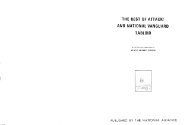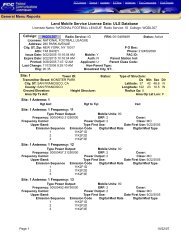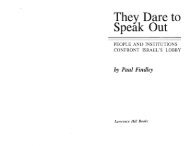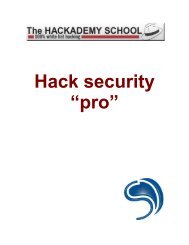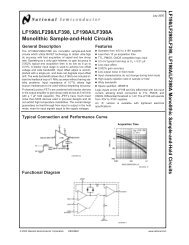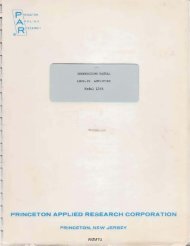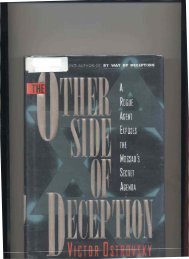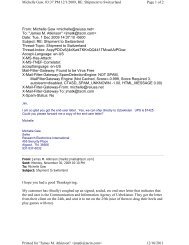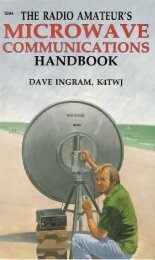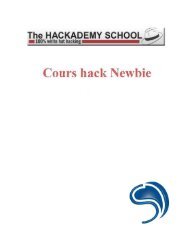You also want an ePaper? Increase the reach of your titles
YUMPU automatically turns print PDFs into web optimized ePapers that Google loves.
in the wrong "memory hole" has either probably had a<br />
talking to, or is being investigated even further. This<br />
style and technique vary from words stick, to extra line<br />
spaces, to off indentations, to bogus paragraphs, to typos.<br />
The key is to make the same letter appear some·<br />
what similar, but different enough to identify the<br />
"mole " Also, this technique is performed to weed out<br />
the moles in a high security situation concerning information<br />
warfare.<br />
We 'll never tell.<br />
iZRaXXX<br />
Dear 1600:<br />
I had to write in to point out the errors and miscellaneous<br />
lameness in Frieda's "eGI Flaws" article in<br />
your Spring issue<br />
I CGI is not inherently "flawed" because it runs on<br />
the server-side. It isn't practical or desirable to transmit<br />
large databases to the client so that they can be<br />
processed on his/her machine. How many search engines<br />
do you know that aren't server-side applications?<br />
2. In the fake Is script, what's "copy"? We're on<br />
UNIX, not DOS · try cp ...<br />
3. What are all the extra "./"s for? Those have no ef<br />
feet other than requiring extra typing.<br />
4. Why does the fake Is script run the real Is with no<br />
arguments??? Your ruse will be discovered pretty fast if<br />
the sysadmin uses Is -l or something. The script should<br />
say "Is $*".<br />
5. The fake Is won't be executed if the sysadmin has<br />
' . ' anywhere in his path! It would have to come before<br />
Ibin and lusr/bin. If the sysadmin has '.' in his $PATH<br />
and it doesn't come last he is very stupid indeed. This is<br />
the first commandment of protecting yourself (and your<br />
system) from your users. Besides, this old trick really<br />
has nothing to do with CGI'<br />
6. Frieda says to make .somebinary perfect before<br />
you pull the suid gag. Not very flexible. Why not have<br />
somebinary call .someotherbinary? That way you can<br />
change .someotherbinary to do whatever you want.<br />
7. SUID does indeed work on scripts on many/most<br />
UNIXes, but not with csh . try sh or ksh. On some<br />
UNIXes you need to use something like "#'lbinlsh .p"<br />
to have the system preserve the effective UID.<br />
The "Setting Up Unix Trapdoors" article in the<br />
same issue was much more on-track, though there's one<br />
glaring problem. All of the '>'s should be '» 's ' Other·<br />
wise you're wiping out letc/services, letc/inetd.conf,<br />
and I.rhosts. This will no doubt blow the system out of<br />
the water - not very discreet.<br />
Also, the hint to system admins to search for suid<br />
programs with a modification time later than a certain<br />
date is not very helpful - timestamps are trivial to fake.<br />
diff is also unreliable as you'd need to be diffing against<br />
backup copies of the suid programs which the hacker<br />
will have found and modified if he's worth his salt.<br />
Therefore, it's best to compare checksums. Hardcode<br />
them into an executable so the hacker can't easily just<br />
change them to the new values. And don't call the exe·<br />
cutable compare_suid_checksums - make it something<br />
innocuous so the hacker won't know to monkey with it<br />
Whirlwind<br />
Dear 1600:<br />
nathan@senate.org 's article "setting up unix trapdoors"<br />
has some errors in there that are very misleading<br />
to unix newbies.<br />
I contacted the author and he says he typed things<br />
right, and I believe him. Just a reminder to your editors<br />
and authors I guess that ">" is very different than " » "<br />
The lines echo "nsp 2600/tcp # Network Secunty<br />
Protocol" > jete/services and the associated line in inetd.conf<br />
will replace those files as we all should know.<br />
And you don't want to do that. Using » instead will, of<br />
course, append those lines to their respective files without<br />
overwriting them entirely<br />
emory<br />
Th is was a mistake that occurred on our end during<br />
the layout proct!ss and prohahly one o{ the wurst we<br />
could have made. Ironically, it was a computer error.<br />
We 're sorry/hr any problems it may have caused.<br />
Dear 1600:<br />
Vandal's article in 15: I titled "ANI 2· the adventure<br />
continues", is incorrect about five things:<br />
I) ANACs using ANI II have been in existence for a<br />
while. Over a year now, actually. So they haven't been<br />
"popping up" as vandal suggested. On the same note,<br />
ANI is not ANAC. There is a difference.<br />
2) The call letters used are not Greek leuers; they<br />
are phonetIc letters. "Charlie" is not a Greek letter (as<br />
read off by the dead 800·555 ANAC).<br />
3) The ANI II digits are read out hejiJre the number,<br />
and then only on ANACs that are owned by MCI.<br />
4) The list he provides is not every known ANI II<br />
code, it's every possible ANI II code (He should have<br />
read the damn thing firsL )<br />
5) The 07 code does not signify an operator assisted<br />
call. The 07 denotes that there is some type of restriction<br />
on that line that prevents calling. For example, you are<br />
at a COCOT and you call 1·800-487-9240. It reads back<br />
all of its information and then says "ANI number<br />
0,7,9,1 ,4,6,3,4,9,8,7,6". Perhaps that COCOT has an international<br />
calling block, or a 900 or 0700 block. An·<br />
other example: you are in a condo rented by a resort (as<br />
in you are nut on their PBX). You call up the ANAC, and<br />
it tells you that your ANI II digits are 07. Maybe that<br />
line has a rest.rietion that prevents it from dialing out of<br />
LATA . Or maybe you can't call directory assistance<br />
from that phone. Just for the record, the correct ANI II<br />
digits for an operator assisted call are 34. Check for<br />
yoursclves.<br />
On a different note, while many of the RBOCs have<br />
stopped giving you a dial tone after one side hangs up,<br />
SNET (Southern New England Te lephone, the reigning<br />
LEC in Connecticut) is still doing this' Remember the<br />
easy days of ripping pay phones off by letting 1·800·<br />
LOAN· YES hang up? It's still possible there' Oddly<br />
enough, it seems as ifsome of the countrywide COCOT<br />
providers are unaware of this. Today (7117) I was at a<br />
COCOT that was manufactured by Elcotel when I found<br />
this out, coincidentally. I called up an ANAC to add an·<br />
other pay phone number to my collection, and when the<br />
letters continued on page 48<br />
Fa ll 1998 2600 Magazine Page 3 9




